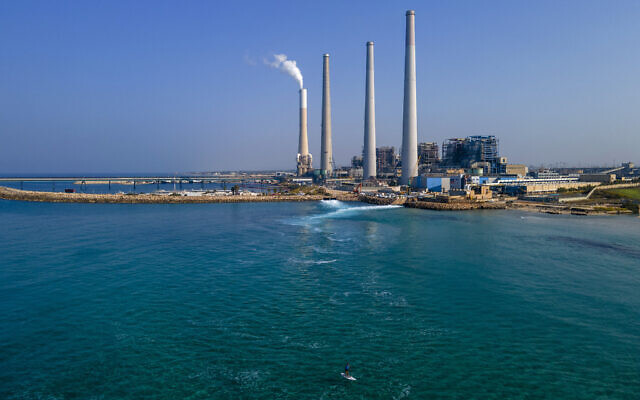Israel is set to reduce its global warming emissions by just 12 percent by 2030, far below the 27% it promised the United Nations Framework Convention on Climate Change, a report published Monday predicted.
If current trends continue, only 19% of energy will be generated by renewable sources by the end of the decade, compared with an official goal of 30%, the document prepared by the Environmental Protection Ministry showed.
The annual report, delivered to the government on Monday, reviewed progress up to the end of 2021 on official emissions reduction targets, both across the economy and within various sectors. The benchmark for reduction levels is the rate in 2015.
Most of these targets — both general and sectoral — were submitted in August 2021 to the United Nations Framework Convention on Climate Change.
The document predicts gaps between targets and realistic achievements on just about every pledge that the government has made.
Regarding solid waste, for example, the UN expects Israeli emissions to drop by at least 47% by the end of this decade, compared with 2015, but these will likely only diminish by 19%, according to the report.
The amount of municipal waste sent to landfills should be slashed by 71%, compared with 2018, when it stood at 4.5 million tons. But a more realistic prediction is that the figure will drop to 3.4 million tons, a reduction of just 24%.

A teenager searches for cans through a garbage container in the center of Jerusalem on September 2, 2020. (Nati Shohat/Flash90)
The electricity sector is supposed to see a 30% drop in emissions by 2030, compared to 2015, but looks set for a cut of only 21%.
Industry is also meant to be on course for a 30% reduction, but is likely to reduce its emissions by just 17%.
Most of the emissions cuts in 2021 came from the electricity sector (a reduction of 10% compared with 2015), as the result of using less coal, Monday’s report said.

A paddle boarder passes the Orot Rabin power station near Hadera, central Israel, November 6, 2022. (AP Photo/ Ariel Schalit)
Emissions from waste were down by 4% during that year, but increased by 13% in industry and by 2% in transportation.
Israel not only lags behind its own targets but is far less ambitious than other developed nations, the report showed.
It said the country only reduced its total emissions throughout 2020 by 2%, compared with 11%-20% in the case of other Western countries. A further 3% were reduced in 2021, but according to the report, this pace is nowhere near enough to hit 27% by 2030.

Gil Proaktor, head of Climate Change Policy at the Environmental Protection Ministry. (Environmental Protection Ministry)
Co-presenting the findings alongside Environmental Protection Minister Idit Silman and other ministry officials, Gil Proaktor, head of climate change policy in the ministry, said policymakers needed to understand that lowering emissions benefits the economy.
The emissions cuts that were made in 2021 saved the economy NIS 2.7 billion ($745 million), he said, without taking into account the indirect savings on damage to the environment and public health from pollution. This saving would grow to NIS 10 billion ($2.8 billion) if the government hits its targets in 2030.
But to do so requires the passing of a Climate Law, which would oblige the government to meet its goals, set out the infrastructure for doing so, and provide certainty to the market.
It would also mean introducing a carbon tax, Proaktor continued, warning that if Israeli manufacturers and exporters are not forced to pay the tax in Israel, they will be charged at the borders of other countries, in a move that would affect their competitiveness.
The European Union’s Carbon Border Adjustment Mechanism, for example, will start coming into force in October.
The report provides a long list of steps that the government should take to speed up and meet its declared targets.
These include converting methane from sewage treatment plants into energy, developing and implementing programs to slash emissions in agriculture, and to ensure energy efficiency in general, closing the petrochemical industries in the northern city of Haifa by 2030, and moving much faster towards replacing fossil fuels with renewables to generate electricity.
Additional steps include closing coal-fired power plants, making solar panels obligatory on all new buildings (contractors can currently choose between solar and fossil fuel gas), adapting the electricity distribution network so that it can cope with more renewable energy, and providing cash to incentivize the installation of EV car charging stations and of solar panels on sites that are already in use, for example, as parking lots.
"behind" - Google News
May 02, 2023 at 02:40AM
https://ift.tt/Tf0kS2U
Israel falling far behind its own global warming emissions targets - The Times of Israel
"behind" - Google News
https://ift.tt/Roz0WfI
https://ift.tt/DpCSPL7
Bagikan Berita Ini















0 Response to "Israel falling far behind its own global warming emissions targets - The Times of Israel"
Post a Comment